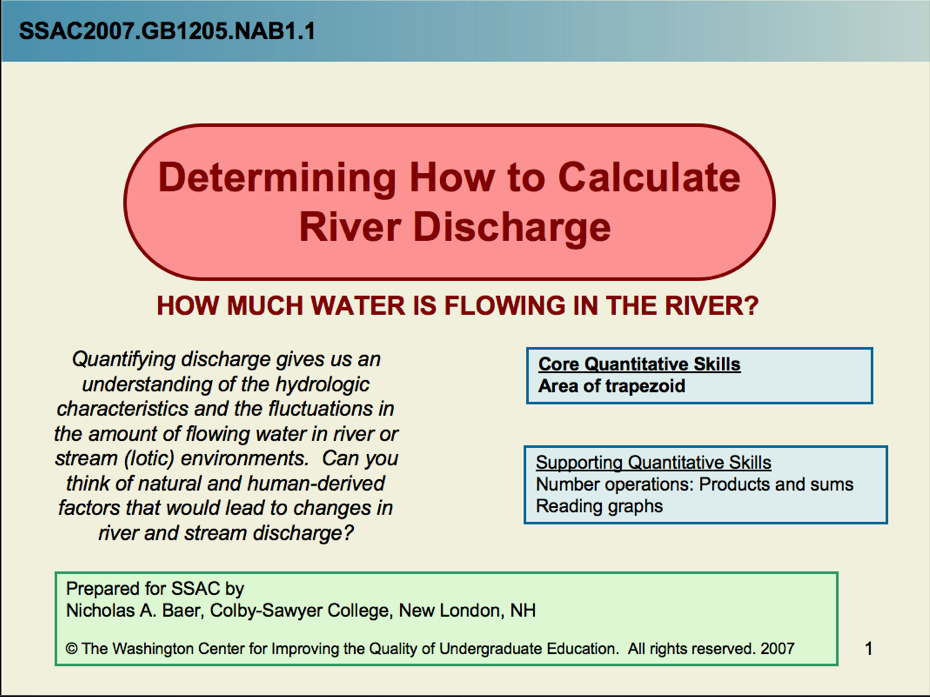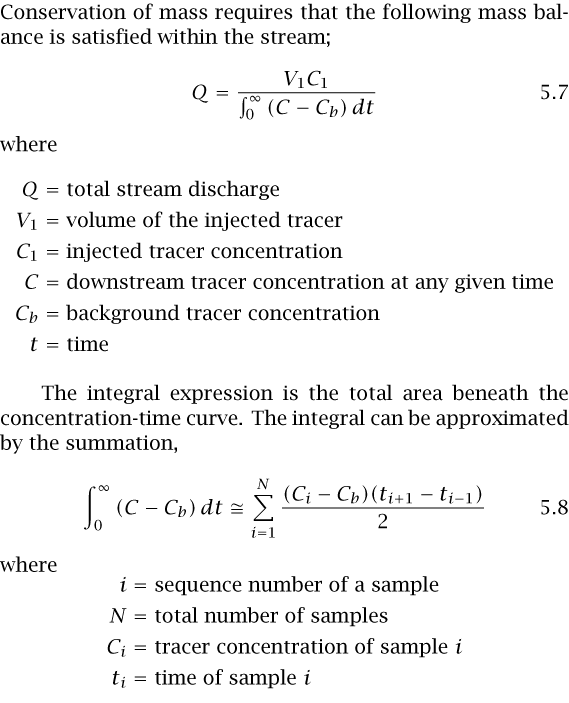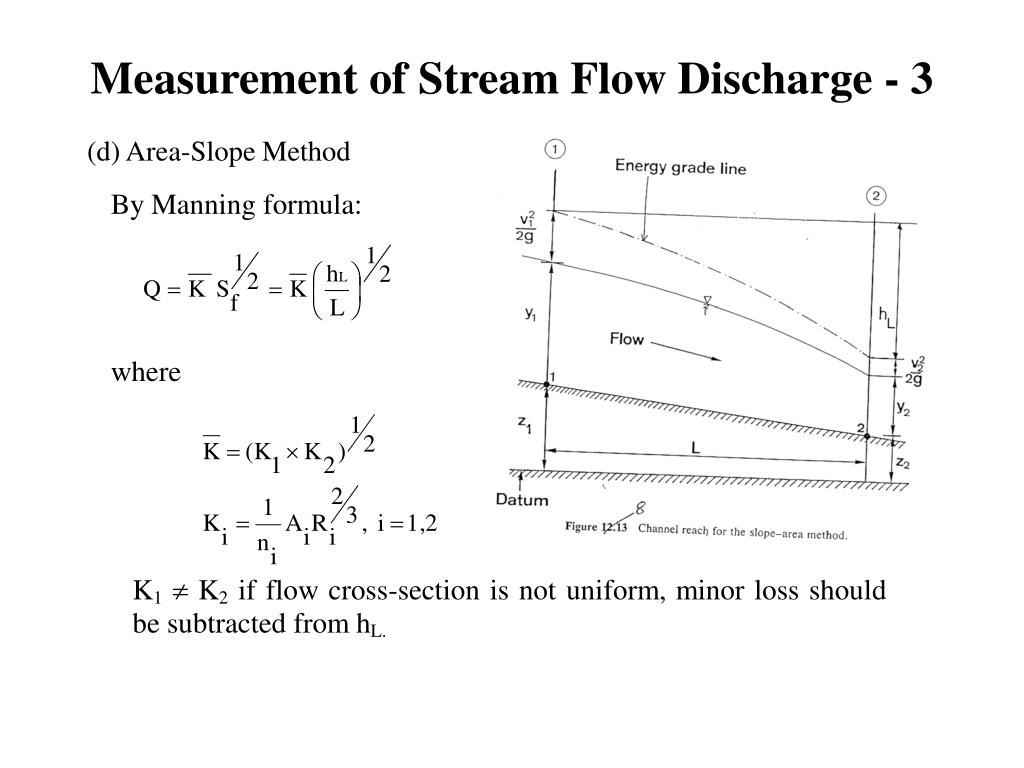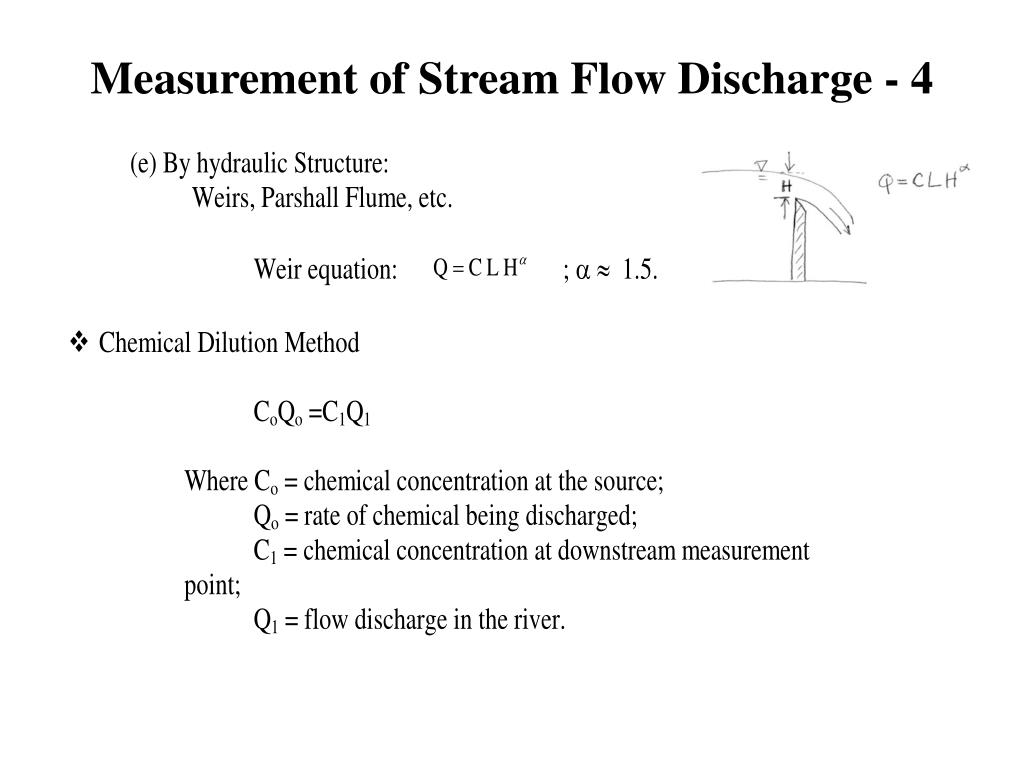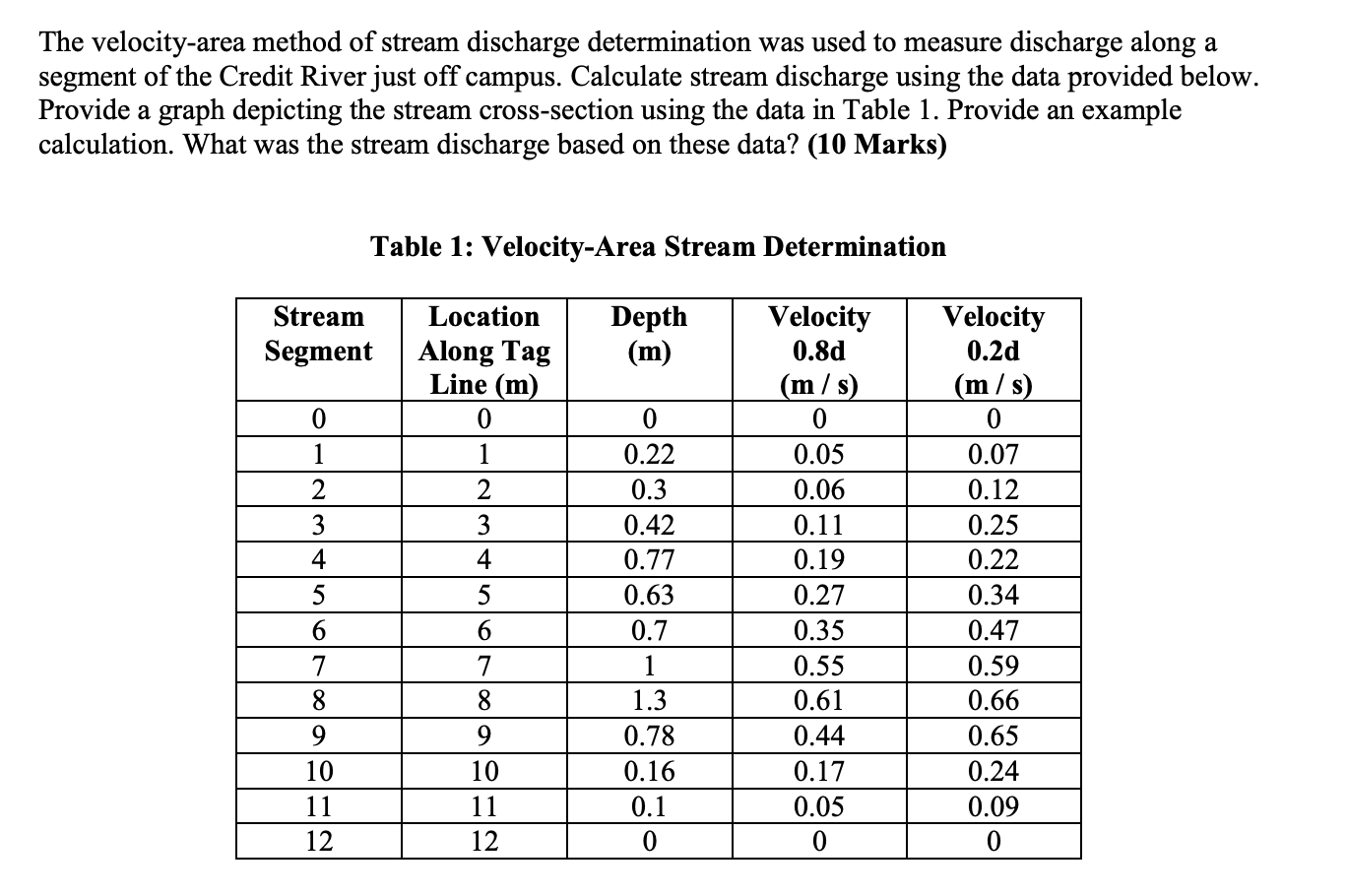Formula For Stream Discharge - The amount of fluid passing a section of a stream in unit time is called the discharge. Streamgaging generally involves 3 steps: The formula for stream discharge is q = a × v, where q is the discharge (measured in cubic meters per second, m 3 /s), a is the cross. Stream discharge is typically expressed in cubic meters per second (m 3 /s) and can be calculated using the formula: Q = a x v, where q is the. The four methods of stream gauging to be considered are (i) the area velocity method, (ii) the slope area method, (iii) the weir method. Measuring stream stage —obtaining a continuous record of stage—the height of the. The equation implies that for any incompressible fluid, such as liquid water, the discharge (q) is equal to the product of the stream's cross. If v is the mean velocity and a is the cross sectional area,.
Streamgaging generally involves 3 steps: The amount of fluid passing a section of a stream in unit time is called the discharge. Measuring stream stage —obtaining a continuous record of stage—the height of the. Q = a x v, where q is the. Stream discharge is typically expressed in cubic meters per second (m 3 /s) and can be calculated using the formula: If v is the mean velocity and a is the cross sectional area,. The formula for stream discharge is q = a × v, where q is the discharge (measured in cubic meters per second, m 3 /s), a is the cross. The equation implies that for any incompressible fluid, such as liquid water, the discharge (q) is equal to the product of the stream's cross. The four methods of stream gauging to be considered are (i) the area velocity method, (ii) the slope area method, (iii) the weir method.
Stream discharge is typically expressed in cubic meters per second (m 3 /s) and can be calculated using the formula: The formula for stream discharge is q = a × v, where q is the discharge (measured in cubic meters per second, m 3 /s), a is the cross. Measuring stream stage —obtaining a continuous record of stage—the height of the. Q = a x v, where q is the. The four methods of stream gauging to be considered are (i) the area velocity method, (ii) the slope area method, (iii) the weir method. If v is the mean velocity and a is the cross sectional area,. The equation implies that for any incompressible fluid, such as liquid water, the discharge (q) is equal to the product of the stream's cross. Streamgaging generally involves 3 steps: The amount of fluid passing a section of a stream in unit time is called the discharge.
PPT CHAPTER FIVE STREAM FLOW AND RAINFALL RUNOFF PowerPoint
Q = a x v, where q is the. The four methods of stream gauging to be considered are (i) the area velocity method, (ii) the slope area method, (iii) the weir method. Measuring stream stage —obtaining a continuous record of stage—the height of the. The amount of fluid passing a section of a stream in unit time is called.
Exercise to Calculate River Discharge
Streamgaging generally involves 3 steps: Measuring stream stage —obtaining a continuous record of stage—the height of the. Q = a x v, where q is the. If v is the mean velocity and a is the cross sectional area,. The equation implies that for any incompressible fluid, such as liquid water, the discharge (q) is equal to the product of.
Ch ppt download
Streamgaging generally involves 3 steps: The amount of fluid passing a section of a stream in unit time is called the discharge. Q = a x v, where q is the. The formula for stream discharge is q = a × v, where q is the discharge (measured in cubic meters per second, m 3 /s), a is the cross..
Measure Stream Discharge Using the Continuity Equation Baugh Hinst1979
Stream discharge is typically expressed in cubic meters per second (m 3 /s) and can be calculated using the formula: The four methods of stream gauging to be considered are (i) the area velocity method, (ii) the slope area method, (iii) the weir method. If v is the mean velocity and a is the cross sectional area,. The equation implies.
PPT STREAMFLOW and HYDROGRAPH ANALYSIS PowerPoint Presentation, free
If v is the mean velocity and a is the cross sectional area,. Stream discharge is typically expressed in cubic meters per second (m 3 /s) and can be calculated using the formula: Measuring stream stage —obtaining a continuous record of stage—the height of the. Streamgaging generally involves 3 steps: The four methods of stream gauging to be considered are.
Hydrology Equation of Stream Discharge1 YouTube
Q = a x v, where q is the. The four methods of stream gauging to be considered are (i) the area velocity method, (ii) the slope area method, (iii) the weir method. The amount of fluid passing a section of a stream in unit time is called the discharge. Measuring stream stage —obtaining a continuous record of stage—the height.
Stream Discharge Formula
The amount of fluid passing a section of a stream in unit time is called the discharge. The equation implies that for any incompressible fluid, such as liquid water, the discharge (q) is equal to the product of the stream's cross. The four methods of stream gauging to be considered are (i) the area velocity method, (ii) the slope area.
PPT STREAMFLOW and HYDROGRAPH ANALYSIS PowerPoint Presentation, free
The formula for stream discharge is q = a × v, where q is the discharge (measured in cubic meters per second, m 3 /s), a is the cross. The four methods of stream gauging to be considered are (i) the area velocity method, (ii) the slope area method, (iii) the weir method. If v is the mean velocity and.
Solved The velocityarea method of stream discharge
If v is the mean velocity and a is the cross sectional area,. The amount of fluid passing a section of a stream in unit time is called the discharge. The equation implies that for any incompressible fluid, such as liquid water, the discharge (q) is equal to the product of the stream's cross. The formula for stream discharge is.
Lecture4(hydro)
Stream discharge is typically expressed in cubic meters per second (m 3 /s) and can be calculated using the formula: Streamgaging generally involves 3 steps: The four methods of stream gauging to be considered are (i) the area velocity method, (ii) the slope area method, (iii) the weir method. Measuring stream stage —obtaining a continuous record of stage—the height of.
The Equation Implies That For Any Incompressible Fluid, Such As Liquid Water, The Discharge (Q) Is Equal To The Product Of The Stream's Cross.
Measuring stream stage —obtaining a continuous record of stage—the height of the. The formula for stream discharge is q = a × v, where q is the discharge (measured in cubic meters per second, m 3 /s), a is the cross. The four methods of stream gauging to be considered are (i) the area velocity method, (ii) the slope area method, (iii) the weir method. Streamgaging generally involves 3 steps:
If V Is The Mean Velocity And A Is The Cross Sectional Area,.
The amount of fluid passing a section of a stream in unit time is called the discharge. Stream discharge is typically expressed in cubic meters per second (m 3 /s) and can be calculated using the formula: Q = a x v, where q is the.

